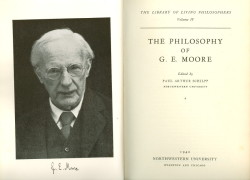A new entry in the ongoing contest to find the longest sentences written in the history of philosophy. Submitted by Ken Brown, a 239-word self-reflective monster from G. E. Moore’s “A Defence of Common Sense”:
 ‘In other words what (2) asserts is only (what seems an obvious enough truism) that each of us (meaning by “us,” very many human beings of the class defined) has frequently known, with regard to himself or his body and the time at which he knew it, everything which, in writing down my list of propositions in (1), I was claiming to know about myself or my body and the time at which I wrote that proposition down, i.e. just as / knew (when I wrote it down) “There exists at present a living human body which is my body,” so each of us has frequently known with regard to himself and some other time the different but corresponding proposition, which he could then have properly expressed by, “There exists at present a human body which is my body”; just as I know “Many human bodies other than mine have before now lived on the earth,” so each of us has frequently known the different but corresponding proposition “Many human bodies other than mine have before now lived on the earth”; just as I know “Many human beings other than myself have before now perceived, and dreamed, and felt,” so each of us has frequently known the different but corresponding proposition “Many human beings other than myself have before now perceived, and dreamed, and felt”; and so on, in the case of each of the propositions enumerated in (1).’
‘In other words what (2) asserts is only (what seems an obvious enough truism) that each of us (meaning by “us,” very many human beings of the class defined) has frequently known, with regard to himself or his body and the time at which he knew it, everything which, in writing down my list of propositions in (1), I was claiming to know about myself or my body and the time at which I wrote that proposition down, i.e. just as / knew (when I wrote it down) “There exists at present a living human body which is my body,” so each of us has frequently known with regard to himself and some other time the different but corresponding proposition, which he could then have properly expressed by, “There exists at present a human body which is my body”; just as I know “Many human bodies other than mine have before now lived on the earth,” so each of us has frequently known the different but corresponding proposition “Many human bodies other than mine have before now lived on the earth”; just as I know “Many human beings other than myself have before now perceived, and dreamed, and felt,” so each of us has frequently known the different but corresponding proposition “Many human beings other than myself have before now perceived, and dreamed, and felt”; and so on, in the case of each of the propositions enumerated in (1).’
Plain common sense, indeed.
Kierkegaard is still the contest’s champion, but Moore now passes Aristotle to take over third place.
 1. Kierkegaard: 330 words.
1. Kierkegaard: 330 words.
2. Locke: 309 words.
3. Moore: 239 words.
4. Aristotle: 188 words.
5. Kant: 174 words. (Also: 163 words.)
6. Bentham: 164 words.
7. Mill: 161 words.